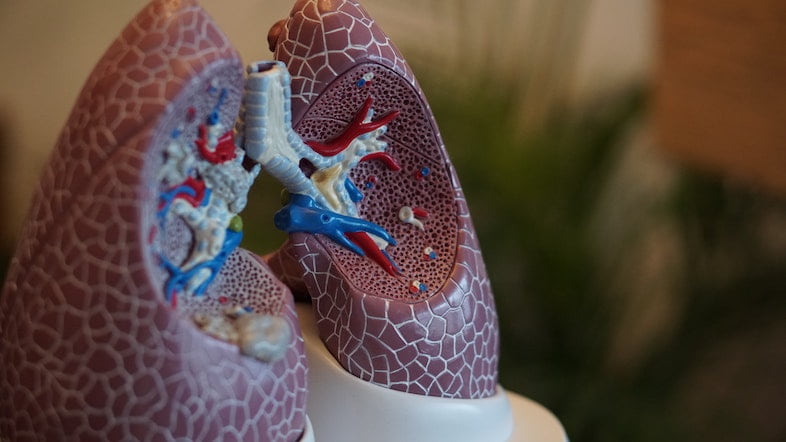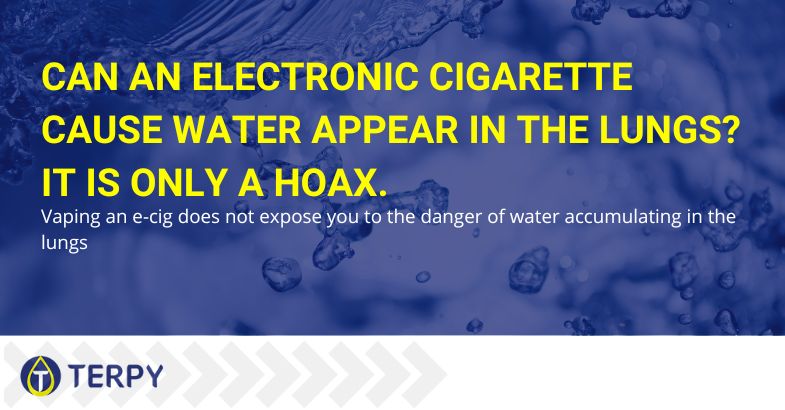Modified on: 27/05/2024
Vaping an e-cig does not expose you to the danger of water accumulating in the lungs
Are you thinking about quitting smoking, and do you think the e-cigarette could be the right tool to achieve this important goal? More and more people find vaping a valuable ally in the fight against smoking. However, e-cigs are often associated with some side effects that are not always true, such as water in the lungs.
This article will clarify why e-cigarettes do not cause water accumulation and what happens in the lungs when you vape.


E-cigs and water in the lungs? A false belief to be debunked
Since it began to gain notoriety, the electronic cigarette has been the subject of countless hoaxes (or fake news, as the case may be) based on baseless theories. Unfortunately, the press, increasingly chasing the scoop and less attentive to verifying sources, has contributed to spreading false or inaccurate news about events related to vaping electronic cigarette liquids and has ensured that even today, many people have a distorted idea of this device.
The serious thing is that among the widespread falsehoods about vaping are some related to such a sensitive topic as health. For example, one harmful effect of vaping is the accumulation of water in the lungs. According to this belief, habitually vaping the vapours generated by heating tobacco, fruity and creamy liquids would include this risk.
Those who spread this rumour have well thought out (without providing any scientific proof) that part of the inhaled vapour, once inside the lungs, returns to a liquid state and causes a severe condition such as pulmonary oedema. Well, you should know that this is a colossal lie, and in the next paragraph, you will find out why vaping does not cause this kind of problem.
Read also: How many types of electronic cigarette coils exist and how to choose the most suitable one
What the electronic cigarette does to your lungs
The Internet is a beautiful tool. Unfortunately, however, too many people use it in the wrong way and come to believe that whatever they read online is true. Doctors and scientists know a thing or two about this. They agree that this is false when it comes to the alleged danger of water accumulating in the lungs due to the electronic cigarette.
After all, one only has to look at vaping liquids’ characteristics and the processes within the respiratory system to dismantle this headless conjecture. Let’s start with liquids: you should know that their composition includes water in a minimum percentage that usually does not exceed 10%. Vaping liquids are comparable to aerosol solutions since water is only one of the ingredients. Consequently, since the amount of water in them is very small, and the lungs assimilate only a portion, there is no cause for concern.
You will say, “OK, but if day after day this insignificant amount is deposited in the lungs, it can cause problems!”
The fact is that this is not the case because the lungs can exchange water vapour with the air in the lung alveoli and eliminate any excess water. So think about when you swallow a drink: does it stay in your lungs, or is it promptly expelled by coughing?
The answer is all too obvious. But if we wanted to take a more straightforward example, it would suffice to think that the air we breathe has a more or less high percentage of water in its gaseous state. Yet those who live in places with a high humidity rate do not face the problem of water accumulating in the lungs.
In short, the lungs can expel water, and vaping introduces so tiny that it is not a problem. However, for some people vaping e-cigs may be a source of respiratory problems.


What ailments can e-cigarettes give?
As many scientists state, vaping is a safe activity compared to smoking. Suffice it to say that e-cigarette users are 95% less likely to suffer illnesses and damage to the body than smokers of analogue cigarettes.
However, this is not to say that vaping cannot create lung discomfort. Some people experience pain, such as coughing and shortness of breath, during and after inhaling vapours. This is a fairly common occurrence in the presence of asthma or allergies to certain substances in the e-liquid base or certain vaping flavours.
Since these conditions are usually chronic, it would be a good idea to consult a doctor before vaping. One thing is sure, however: inhaling vapor exposes you to fewer ailments than cigarette smoking.
Read also: Electronic cigarette, diacetyl and popcorn lung: let’s clarify
In conclusion
Now that you know that vaping does not expose you to the risk of accumulating water in the lungs, you can safely consider adopting this method to try to stop smoking.
On Terpy‘s site, you will find a large selection of ready-to-use vape liquids and everything you need to craft them, including liquid nicotine.





